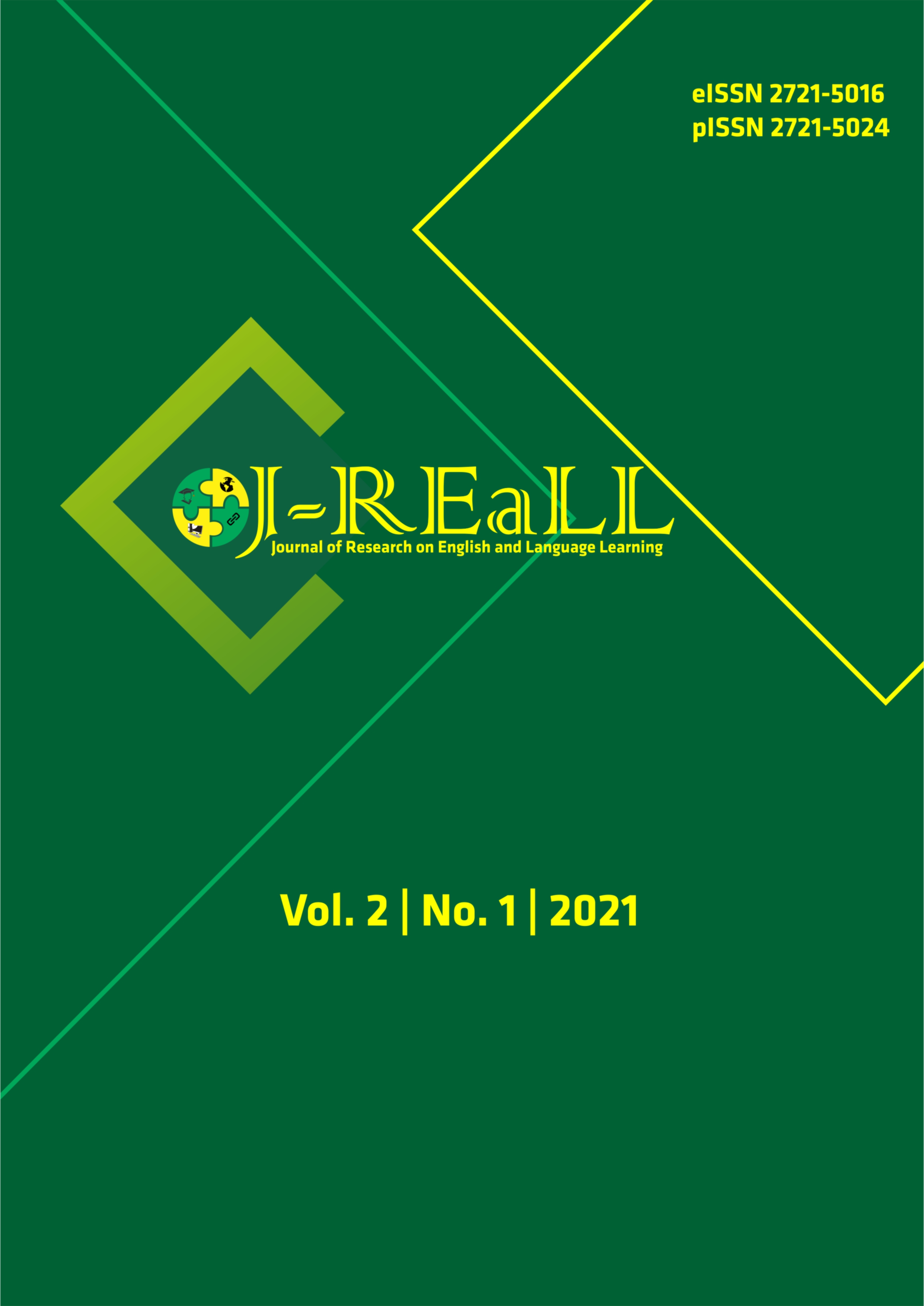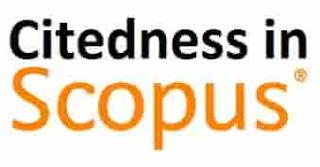The relational patterns of selected factors influencing the EFL college learners' reading comprehension
DOI:
https://doi.org/10.33474/j-reall.v2i1.6922Keywords:
metacognitive awareness, self-efficacy, motivation, EFL reading comprehensionAbstract
Having an effect on reading, metacognitive awareness, self-efficacy and motivation are considered as the main factor in affecting EFL reading comprehension. Thus, the aim of the present study is to investigate the relational pattern of those selected factors toward EFL reading comprehension and investigates the contribution of each variable. The design is categorized as quantitative study. The subjects of the study consisted of 90 students of the English Letters and Language, Humanity Faculty, UIN Maliki Malang. The instruments used in this study are a test and questionnaires. Moreover, the data are analyzed using multiple regression techniques including a correlation design called Path Analysis. The result of the study has shown that the regression model in the first layer is proven insignificant to the independent variable. The total contribution of all variables in the first layer is 2.5%. While, the regression model of second layer is proven significant. The total contribution of all variables in the path diagram in the second layer of this study is 44.86%. Based on the result, it is suggested for the future research to have a research on other factors such as combining affective and cognitive factors while considering students' diversity such proficiency level, personality and gender.
References
Baumann, J. F., Jones, L. A., & Seifert-Kessel, N.1993. Using Think A louds to Enhance Children's Comprehension Monitoring Abilities. The Reading Teacher, 47(3), 184-193.
Bandura, A. 1993. Perceived self-efficacy in cognitive development and functioning. Educational Psychologist, 28,117-148.
Bandura, A. 1997. Self-efficacy in Changing Societies. Cambridge: Cambridge University Press.
Bandura, A. 2006. Guide for constructing self-efficacy scales. In F. Pajares & T. Urdan (Eds.) Self-efficacy beliefs of adolescents. Greenwich, CT: Information Age Publishing.
Brown, H. D. 2007. Teaching by Principles: an interactive approach to language pedagogy (3rd ed.). New York: Pearson Education.
Cahya, P. 2015. Modelling Relationship among Selected Affective Factors and EFL proficiency of College Students. Unpublished Thesis. Malang: State University of Malang.
Dornyei, Z. 1998. Motivation in Second and Foreign Language Learning. Journal of Cambridge: Language Teaching, 31 (3), 117-135.
Dornyei, Z. 2001. Teaching and Researching Motivation. London: Pearson Education Limited.
Flavell, J. H. 1979. Metacognition and Cognitive Monitoring: A New Area of Cognitive-Developmental Inquiry. American Psychologist, 34, 906-911.
Gall, M. D., Gall, J.P., & Borg, W. R. &. 2007. Educational Research: An Introduction. (8th Edition). New York: Pearson.
Gardner, R. C. 1985. Social Psychology and Second Language Learning: The Role of Attitudes and Motivation. London: Edward Arnold Publishers.
Ghonsooly, B. & M, Elahi. 2011. Learners' Self-efficacy in Reading and its relation to Foreign Language Reading Anxiety and Reading Achievement. Journal of English Language Teaching and Learning Year, 53 (217).
Goldenberg, C. 2011. Reading Instruction for English Language Learner. Handbook for Reading Research. 4, 684-710.
Grabe, W. 1991. Current developments in second language reading research. TESOL Quarterly, 25(3), 375-406.
Guthrie, J. T. 2008. Reading motivation and engagement in middle and high school: Appraisal and intervention. In J. T. Guthrie (Eds.), Engaging adolescents in reading (pp. 1-16). Thousand Oaks, CA: Corwin Press.
Henter, R. 2014. Affective Factors Involved in Learning a Foreign Language. Procedia-Social and Bihavioral Sciences, 127, 373-378.
Jacobs, J. E. & Paris, S. G. 1987. Childrens' Metacognition about Reading: Issues in Definition, measurement and instruction. Educational Psychologist, 22: 255-278.
Kargar, M & Zamanian, M. 2014. The Relationship between Self-Efficacy and Reading Comprehension Strategies Used by Iranian Male and Female EFL Learners. International Journal of Language Learning and Applied Linguistics World (IJLLALW), 7 (2), 313-325.
Meniado, J. C. 2016. Metacognitive Reading Strategies, Motivation, and Reading Comprehension Performance of Saudi EFL Students. English Language Teaching journal Canadian Center of Science and Education, 9 (3): 117- 129.
McNamara, D. S. 2007. Reading Comprehension Strategies: Theories, Interventions and Technologies. Mahwah: Lawrence Erlbaum Associates.
Musthofiyah, U. 2015. A Model of Reading Comprehension of EFL College Learners Observed from Reading Self Efficacy, Reading Attitude and Reading Frequency across Gender. Unpublished Thesis. Malang: State University of Malang.
Norris-Holt, J. 2001. Motivation as a contributing factor Second Language Acquisition. The Internet TESL Journal, 7 (6): 1-8.
Ormrod, J.E. 2004. Human Learning. New Jersey: Pearson.
Pajares, F. 1996. Self-efficacy beliefs in academic settings. Review of Educational Research, 66(4), 543-578.
Phan, N. 2006. Effective reading. Retrieved from http://www.asian-efl-journal.com/pta_october_06_np.php.
Pintrich, P. R. 2003. A Motivational Science perspective on the Rule of Students Motivation in Learning and Teaching Context. Journal of Educational Psychology. 95, 667-686.
Pressley, M., & Gaskins, I. 2006. Metacognitively competent reading comprehension is constructively responsive reading: how can such reading be developed in students? Metacognition Learning, 1(1), 99-113.
Rahemi, J. 2007. Self-efficacy and Iranian Senior High School Students Majoring in Humanities. Novitas-ROYAL (Research on Youth and Language), 1(2), 98-111.
Rahimi, M. & Katal, M. 2012. Metacognitive Strategies Awareness and Success in Learning English as a Foreign Language: An Overview. Procedia Social and Behavioral Sciences. 31, 73-81.
Schunk, D. H., & Zimmerman, B. J. 1997. Social origins of self-regulatory competence. Educational Psychologist, 32(4), 195-208.
Schraw, G. & Dennison, R. S. 1994. Assessing Metacognitive Awareness. Contemporary Educational Psychology. 19, 460-475.
Schraw, G. 1998. Promoting General Metacognitive Awareness. Kluwer Academic Publishers Instructional Science 26; 113-125.
Snow, C. 2002. Reading for understanding: Toward an R&D program in reading comprehension. Santa Monica: Rand Education.
Sternberg, R. J. 1998. Metacognition, Abilities and Developing Expertise: What Make An Expert Student?. Instructional Science, 26, 127-140.
Torgesen, J. K. 2000. Individual Differences in Response to Early Intervention in Reading: The Lingering Problem of Treatment Resisters. Learning Disabilities Research and Practice, 15 (1): 55-64.
Richards, J. C and Renandya, W. A. 2002. Methodology in Language Teaching. an Anthology of Current Practice. Cambridge: Cambridge University Press.
Vandergrift, L. 2005.Relationship Among Motivation Orientation, Metacognitive Awareness and Proficiency in L2 Listening. Applied Linguistics, 26, 70-89.
Yokochi, L. 2003. Affective Factors in Second Language Acquisition: A critical Review of the Literature. Unpublished Thesis. Morgantown: West Virginia University.
Young, A., Fry, J. D. 2008. Metacognitive Awareness and Academic Achievement in College Students. Journal of the Scholarship of Teaching and Learning, 8 (2): 1-10.
Downloads
Published
How to Cite
Issue
Section
License
Copyright (c) 2021 Nuriyatul Hamidah

This work is licensed under a Creative Commons Attribution 4.0 International License.
Authors who publish this journal agree to the following terms:
- Authors retain copyright and grant the journal right of first publication with the work simultaneously licensed under a Creative Commons Attribution License that allows others to share the work with an acknowledgement of the work's authorship and initial publication in this journal.
- Authors can separately make additional contractual arrangements for non-exclusive distribution published by the journal (e.g., publish it in a book), with an acknowledgement of its initial publication in this journal.
- Authors are allowed and encouraged to send their work via online (e.g., in the institutional repositories or their website) after published by the journal.






















